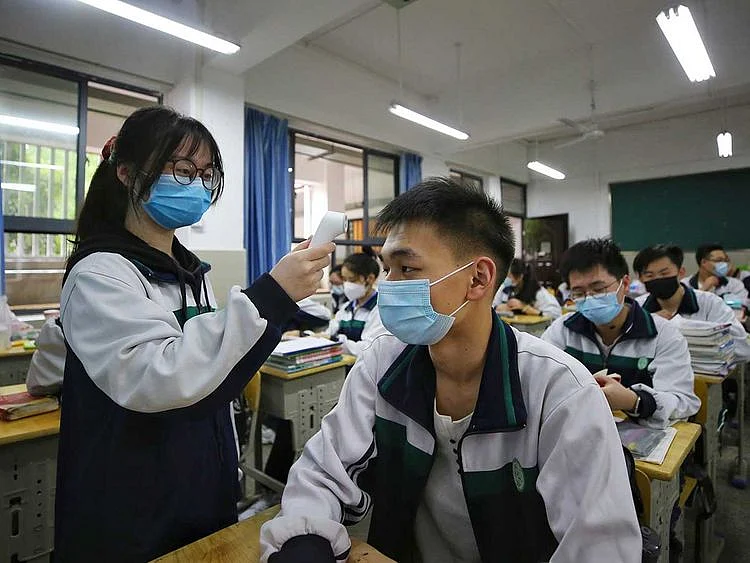COVID-19: Nations take cautious steps towards normality
A round-up of the top stories from around the world in the fight against the coronavirus

Dubai: Children in the Chinese city of Wuhan, ground zero for the coronavirus pandemic, went back to class on Wednesday as the world took cautious steps towards normality.
Senior students in the city were back in front of chalk boards and digital displays for the first time since the virus exploded at the start of the year.
In neighbouring South Korea workers went back to offices, and museums and libraries reopened under eased social distancing rules after new cases dropped to a trickle.
In Germany, Chancellor Angela Merkel has agreed with premiers of the country’s 16 states to make sure local action is taken quickly to prevent individual, local, coronavirus outbreaks from spreading around the country.
"We are following a bold path," said Merkel. "We can afford to be a bit bold but we must remain cautious."
At least 257,687 people have died of the novel coronavirus since the epidemic surfaced in China late last year, according to an AFP tally. There have been more than 3,675,869 officially recorded cases spanning 195 countries and territories.
At least 90,000 health-care workers worldwide are believed to have been infected with COVID-19, and possibly twice that, amid reports of continuing shortages of protective equipment, the International Council of Nurses (ICN) said on Wednesday.
The disease has killed more than 260 nurses, it said in a statement, urging authorities to keep more accurate records to help prevent the virus from spreading among staff and patients, agencies reported.
UK: Care homes and a resignation
British health minister Matt Hancock on Wednesday denied not giving adequate care to elderly people in care homes by prioritising hospitals in the fight against the coronavirus.
“No we didn’t do this ... we have, from the start, worked very hard to protect people in care homes,” Hancock said.
Meanwhile, one of the UK’s key scientific advisers quit after receiving secret visits from his girlfriend amid the pandemic lockdown. Britain's health secretary said the rules were "for everyone.''
Imperial College epidemiologist Neil Ferguson developed models that predicted hundreds of thousands would die unless the UK imposed drastic restrictions to slow the spread of the coronavirus, AFP reported. Ferguson quit the government's scientific advisory panel late Tuesday after the Daily Telegraph newspaper reported that a woman he is in a relationship with had crossed London to visit him at his home.
Will he, won’t he?
US President Donald Trump on Wednesday appeared to go back on plans to shut down the task force advising him on the coronavirus pandemic. Only a day earlier, the White House had said that the high-level team could close around the start of June.
But in a series of tweets Wednesday, Trump said the task force had been so successful that it "will continue on indefinitely with its focus on SAFETY & OPENING UP OUR COUNTRY AGAIN."
The president, however, said that he could "add or subtract people" to the group, which suggested the situation remained fluid.
The coronavirus task force has spearheaded the response to the virus, which has already killed more than 70,000 Americans.
A fast-mutating virus?
Researchers at Los Alamos National Laboratory in the US have reported that a particular strain of the novel coronavirus has emerged in Europe and become dominant around the planet, leading them to believe the virus has mutated to become more contagious, Washington Post reported.
The research paper has not yet been reviewed by other experts, and it is yet to be ascertained what this means. Yes, viruses mutate. But which of these mutations make them more severe or infectious? On the positive side, the scientists did not find evidence that patients with the mutant strain of the virus were more likely to be hospitalised.
Where did the virus originate?
The debate about the origins of the virus refuses to die down.
China dared the US Secretary of State Mike Pompeo to show the "enormous evidence" he claimed to have to prove that the novel coronavirus originated from a lab in Wuhan.
On Wednesday, Pompeo renewed his widely contested charge that the coronavirus pandemic originated in a Chinese laboratory, but acknowledged there was no certainty. "We don't have certainty, and there is significant evidence that this came from the laboratory. Those statements can both be true," Pompeo told reporters.
Sign up for the Daily Briefing
Get the latest news and updates straight to your inbox
Network Links
GN StoreDownload our app
© Al Nisr Publishing LLC 2026. All rights reserved.